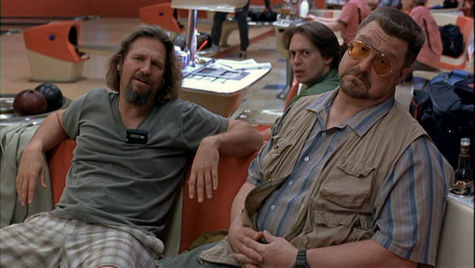It’s possible that I overrated Twilight and underrated The Big Lebowski in this Chicago Reader piece (March 6, 1998); I’d have to resee both these films in order to be sure. —J.R.


The Big Lebowski
Rating ** Worth seeing
Directed by Joel Coen
Written by Joel and Ethan Coen
With Jeff Bridges, John Goodman, Julianne Moore, Steve Buscemi, David Huddleston, Philip Seymour Hoffman, John Turturro, David Thewlis, Ben Gazzara, and Jon Polito.
Twilight
Rating *** A must see
Directed by Robert Benton
Written by Benton and Richard Russo
With Paul Newman, Susan Sarandon, Gene Hackman, James Garner, Stockard Channing, Reese Witherspoon, and Giancarlo Esposito.
It’s purely a matter of chance that two neo-Chandler mysteries with contemporary Los Angeles settings are opening this week. But although Joel and Ethan Coen’s The Big Lebowski and Robert Benton’s Twilight differ in tone, style, milieu, and generational perspective, both films arrive at their private-eye stories through the unorthodox detour of the western. In Benton’s case the western reference is harder to detect but central to the conception throughout; the film even climaxes with the equivalent of a western showdown and shoot-out. In the Coens’ case it’s much more blatant but proves to be window dressing. Read more

From the August 11, 2006 Chicago Reader. — J,.R.
World Trade Center
** (Worth seeing)
Directed by Oliver Stone
Written by Andrea Berloff
With Nicolas Cage, Michael Pena, Maria Bello, Maggie Gyllenhaal, Jay Hernandez, Armando Riesco, and Michael Shannon
“The Holocaust is about six million people who get killed,” Stanley Kubrick reportedly said to screenwriter Frederic Raphael in the late 90s. “Schindler’s List was about 600 people who don’t.” Assuming the quote is right, Kubrick’s speaking about the Holocaust in the present tense and about a movie made half a century later in the past tense suggests something about his priorities.
They probably aren’t the priorities of Oliver Stone, whose ruthlessly circumscribed World Trade Center isn’t about the 2,749 citizens of 87 countries who got killed in the 9/11 assault on the Twin Towers and who are mentioned only in a title when the movie’s over. It’s about two citizens of one of those countries who survived, John McLoughlin and William Jimeno, both real-life Port Authority policemen. The story of what they experienced is gripping and inspiring, but however true it is to their lives — it’s hard to imagine any two men on the planet could be as conventional as the filmmakers make these heroes — the way it’s told restricts what the movie can say about the larger tragedy. Read more
Some thoughts on Kon Ichikawa, from the June 3, 1988 issue of Chicago Reader. — J.R.

AN ACTOR’S REVENGE
**** (Masterpiece)
Directed by Kon Ichikawa
Written by Daisuke Ito, Teinosuke Kinugasa, and Natto Wada With Kazuo Hasegawa, Fujiko Yamamoto, Ayako Wakao, Ganjiro Nakamura, and Raizo Ichikawa.

ALONE ON THE PACIFIC (aka ALONE ACROSS THE PACIFIC)
*** (A must-see)
Directed by Kon Ichikawa
Written by Natto Wada
With Yujiro Ishihara, Kinuyo Tanaka, Masayuki Mori, Ruriko Asaoka, and Hajime Hana.
Scopophilia is a Freudian term that means the love of gazing, or pleasure in seeing. A punning use of the word often comes to mind when I consider the pleasures to be found in viewing ‘Scope movies. ‘Scope is movie buffs’ jargon for the anamorphic widescreen process known as CinemaScope (introduced by Twentieth Century-Fox in 1953 with The Robe) and a number of similar wide-screen formats; they dominated commercial filmmaking across much of the globe for well over a decade.
While a certain number of American movies today still make expressive use of this Band-Aid-shaped format — Shy People is an outstanding recent example — most directors consciously avoid it because they know that at least a third of the image will get lopped off when their work gets transferred to video. Read more





